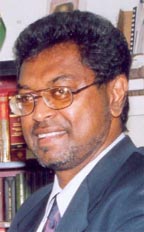The dossier, which was released last month, is intended to establish that there is a sufficient ‘prima facie’ basis to warrant further interrogation of grave human rights abuses by an independent body with the requisite legal authority.
Opposition leader Robert Corbin told Stabroek News that it is still too soon to gauge the success of the work, but he noted that the parties have followed through with their plan to ensure wide circulation of the document. He noted that it was circulated at the recent Commonwealth Heads of Government meeting in Trinidad. Further, Corbin said the Commonwealth Secretary General Kamalesh Sharma responded, indicating that the matter would be considered.
Corbin also said that the dossier was sent to several capitals and parliaments in addition to groups. It has also been handed over the US State Department. He added that getting the dossier out is an achievement in itself, since it corrects the government’s “propaganda,” which he said paints an idyllic picture of the country. “Our story is being told,” Corbin said, while adding that an international inquiry remains “the most important objective” that the opposition is pursuing.

Corbin has argued that neither the government nor the police force has demonstrated that it could be trusted with the responsibility of conducting a thorough probe.
The dossier, compiled by the PNCR, the AFC, GAP, the WPA and the NFA, chronicles a decade and a half of unlawful killings and warns that a failure to launch an international investigation could fuel a cycle of hatred that could stoke the return of violence. Among the contents of the document are a partial list of citizens unlawfully killed between 1993 and 2002; a partial list of citizens allegedly shot to death [and] otherwise unlawfully killed by the ‘Black Clothes’ squad or other rogue elements of the security services, the ‘phantom squad,’ as well as other instances of extra-judicial killing, execution or assassination; and a full list of extra-judicial and other killings between 1993 and 2009, numbering 449. The parties said that because murders were part of the catalogue, they were committed to the fact that statutes of limitation do not apply.
So far, local and regional efforts to get the government to agree to an inquiry have been unsuccessful and the opposition had indicated that it would lobby the UN, the OAS and other organisations for action.
AFC MP Khemraj Ramjattan agrees that the dossier has brought greater attention to the deteriorating security situation in the country, but admits that it has failed to yield the response that was hoped for, adding that the government seems immunised against the demands for an international inquiry. Ramjattan said that one of the main objectives of the dossier was generating national outrage to whip up support for an inquiry. “That has not happened and I doubt the [Bharrat] Jagdeo administration will deliver on that,” he said. According to him, while people are disgusted with the situation, it has not been enough to translate into action to demonstrate the outrage. He said people seem to have become numb.

Ramjattan also admitted that despite the opposition lobby, the international community has also not voiced any response publicly or made demands of the government, although he noted that there may be hesitation for fear of being accused of infringing on the country’s sovereignty.
Nevertheless, he said that the parties have scored a victory in making people aware locally, regionally and internationally, about extra-judicial killings and torture that characterise the deteriorating circumstances of the security sector. He added that in addition to work done by the PNCR and the WPA, the AFC has also been internationalising the issue. He noted that the dossier formed the basis of his recent mission to Canada, while the AFC’s New York/New Jersey Chapter has used it as the basis for a continuing engagement with the US State Department and other agencies.
Meanwhile, GAP-ROAR MP Everall Franklin said the parties did not expect the dossier to yield overnight results. He said regardless of its faults and the criticism it has attracted, the work has highlighted an issue that needed to be addressed. He said it is expected that the dossier would attract the attention it deserves in due time.
Franklin added that immediately, the dossier presents the government with the opportunity to “get its act together” and invite an inquiry into a period of serious conflict that took place within the country, in order to guard against a recurrence. “The longer we continue without an inquiry, the more the country will suffer,” he said, while adding that he would not place a time limit on it, given its importance. “The sooner the better,” he, however, noted.
The revelations of alleged links between the government and Roger Khan, which emerged during the US trial of former Khan lawyer Robert Simels, prompted the joint efforts of the parties. They agreed to compile a comprehensive dossier cataloguing the government’s human rights abuses, including extra-judicial killings, torture and complicity with known organised crime gangs and narco-traffickers.
The government has described the dossier as an attempt at politicking, saying it contained inexplicable and reckless entries as well as major omissions.





